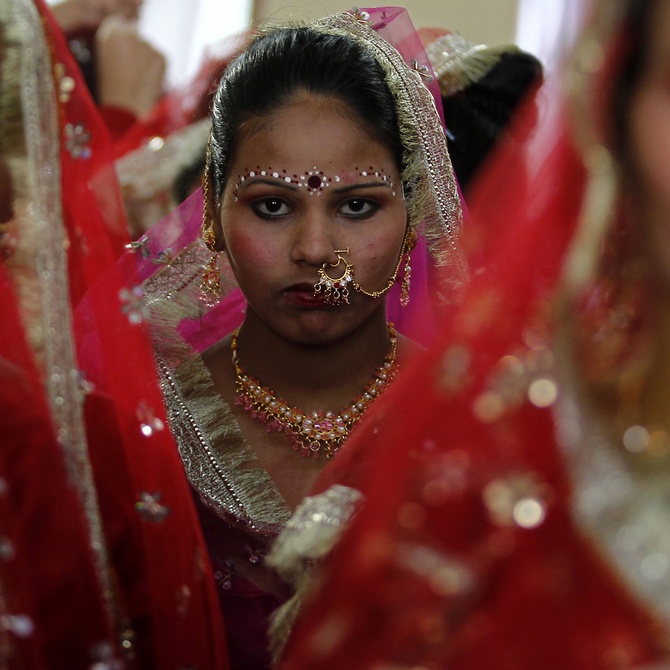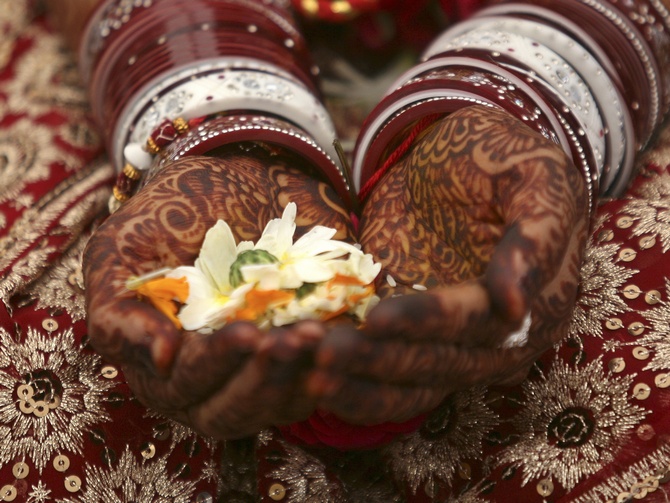
The act of pre-marital sex is an immoral one.
Women having sexual intercourse on assurance of marriage do so at their own peril.
Pre-marital sex needn't always be rape.
These were the main points put forth in a recent ruling by a Delhi court, that acquitted a 29-year-old man of rape charges, filed by a woman he was in a physical relationship with for over six years.
What does this spell for the young and restless? Abhishek Mande Bhot reports
This may come as news to many of you (especially unsuspecting parents of teenagers), but pre-marital sex isn't as uncommon as you may like to believe.
Think of it. More than 50 per cent Indians are under the age of 25, hormones are raging and it isn't like babies are being delivered by storks.
If you still have your doubts, the findings of the India Today Group MDRA Sex Survey (conducted across 19 cities) might interest you:
So it isn't surprising that a sessions court judge Virender Bhatt's remarks about pre-marital sex being immoral haven't gone down well with most.
Bhatt presides over a special fast-track court in Dwarka, Delhi, to deal with cases of sexual assault on women.
Sakshi Kumar, co-founder of a Delhi-based NGO Justice for Women said that this was the sort of thing that "you'd probably expect to hear at home from your parents."
"When one is in a professional space, one needs to know better than to make statements like that," she says.
26-year-old marketing and sales executive Saurabh Pratap Singh agrees. "People are having sex even as we are speaking!" he says.
"We are a country of the Kamasutra and Khajuraho. I don't see why we are making sex out to be such a taboo more so when half of us are just dying to have it!"
"I came out of a five-year-long relationship that was physical in nature, but both of us knew that there were chances we wouldn't end up together. And we didn't. But we both knew that so we went our own ways," he says.
Mumbai family court lawyer Kranti Sathe also says that "the immoral bit was probably uncalled for."
Sathe deals in matrimonial dispute cases. She says: "Perhaps it was the judge's personal view. I am not sure if it is a finding or an observation. I haven't seen the judgement so I cannot say.
"But religion shouldn't have come into the picture at all. The judgement should have just restricted itself to finding if the act amounted to rape," she says.
Note: All pictures used only for representational purpose

The 'False Promise' rape
Social media erupted in protest against the judgement, ignoring perhaps the rest of it, which warned women about getting into a physical relationship with men on assurances of marriage.
While acquitting the 29-year-old accused, of rape charges, filed by a woman he was in a physical relationship with for over six years, Justice Bhatt also ruled that:
When a grown up, educated and office going woman subjects herself to sexual intercourse with a friend or colleague on the latter's promise that he would marry her, she does so at her own peril.
She must be taken to understand the consequences of her act and must know that there is no guarantee that the boy would fulfill his promise. He may or may not do so.
Women accusing men of rape, after being conned into sleeping with them on false assurances of marriage, isn't a new phenomenon in India.
In fact, they are so common, that according to a Wall Street Journal report, New Delhi police even have a term for it -- 'False Promise' complaints.
The allegations in such complaints suggest that all the sexual encounters in the relationship amount to rape because they were sought in a deceptive manner.
But it can be very difficult for a woman to seek justice in such cases.
"Assurance of marriage is often the reason why women agree to get into a physical relationship in the first place," advocate Sathe says, "But that sexual act need not necessarily amount to rape."
"Rape is a serious charge," she says. "What if it's the woman who does not keep her promise of marrying the partner? Would she still go out and accuse the man of raping her? How then can you hold a man responsible when he walks out of a relationship?"
"Was it forced upon her? Had she resisted it? These things need to be proven for it to be labelled as rape.
"Though she can take him to court for breach of promise, the case may not always hold.
"A promise usually entails a written or an implied agreement, which in a situation like this could mean an engagement ceremony, gifts exchanged etc that leads to believe that there is an intention to marry.
"Even then the breach of such a promise may not amount to rape unless the girl can prove that she was forced into having sexual intercourse."
While in some cases e-mails, text messages etc do count as evidence, Sathe says that there often is no legal recourse for a woman to get back at a man for conning her into having sex with him.

Odds stacked up against women
Sakshi Kumar, who is a women's rights activist, says that she has personally known women accusing men of rape simply because they do not live up to their promises.
She says: "Sometimes they do it out of spite; sometimes there is money involved. You never know.
"I cannot comment on the specifics but the judge certainly didn't see any evidence of non-consensual sex in this case.
"Couples have sex and break up. If every woman starts screaming rape, men would be in trouble.
"It is a grey area. Not every man is a devil and woman a saint."
This is all very good if you're in a big city and have had a liberal upbringing.
For most part, we are a country that places utmost importance on a woman's virginity.
According to the India Today Group MDRA Sex Survey, whopping 77 per cent men (across 19 cities) expect their prospective wives to be virgins. That number is as high as 99 per cent in Chennai.
76 per cent of them say they'd turn down the marriage offer if the woman admitted to having had pre-marital sex with someone else.
Additionally, only 15 per cent respondents across the country feel that pre-marital sex is alright, with over 45 per cent vehemently opposing it.
In Indore specifically, 90 per cent respondents thought it was downright wrong.
All of this is despite the fact that men are three times more likely to have pre-marital sex than women, according to the study.
"It is a mindset problem," says Ankita Mehrotra Bharadwaj, a 31-year-old lawyer, who agrees with Sathe in that women are pretty much left to their own devices should things go wrong in such cases."
Janhavi Desai, 20, a collegian from Mumbai, echoes what most young people have been feeling. "No one has the right to decide what is and isn't moral. It is my body and therefore my choice," she says.
"But if I get duped (into having sex with someone), I must also know that it is my problem to deal with it.
"It is much like a business investment gone wrong," Desai adds with the conviction only a 20-year-old can have. "If I were to be in a situation like this, I'd ensure the guy knows what he'd done was wrong. Even after that if he chooses to be an ass, there's nothing more I can do about it. Eventually, I would move on."
Akash Chedda, 18, also doesn't get it. "Why does one have to get married to have sex?" he says. "It really just boils down to a matter of trust and an understanding between the couple. I would give six to eight months of being in a relationship before taking the next step," he says.
"Of course, it (whether you choose to be in a sexual relationship with someone or not) is a personal choice, Bharadwaj says, "And I don't think there is any harm in it but one really must understand the repercussions of one's actions.
"Know that whatever you might think, there will not be strings attached. Somehow, somewhere these things will come to haunt you. Use contraception; more importantly, at all times be aware of what that one action can lead to."
"Most people between the ages of 16 and 35 are very confused. We are exposed to Hollywood and all its 'five-date rule' ideas but we aren't sure how to deal with it if it happens to us.
"We are in a state of transition. Everything is on trial and error."

The 'in-between generation'
Dr Lakshmi Vijayakumar, a Chennai psychiatrist, seconds Bharadwaj.
The young she says are drawn to progressive Western ideas but aren't always able to let go of their traditional Indian roots.
"Unlike the previous generation, that believed in having sexual intercourse only after marriage, the current lot of young people aren't subscribing to that view.
"What is worse is they are also not able to entirely embrace the Western values.
"They often have a romantic idea that their sexual encounter would end up in marriage and when it doesn't, they do not know how to extricate themselves from the situation. Most of them do not have a mechanism of getting out of it.
"None of them can talk about the problem and must often rely on friends who are probably in a similar situation.
"This just complicates matters, makes them depressed and angry and when they find themselves unable to deal with the situation, they find themselves taking a step like this (vituperatively dragging their former partner to court) or worse still, killing themselves."
***
Avoid heart-break
"Pre-marital sex isn't a new phenomenon. It has always existed. People just didn't talk about it," she says.
According to a survey conducted by Outlook magazine way back in 1996, 33 per cent respondents in urban India had pre-marital sex.
Chennai, which still went by its colonial name then, was most promiscuous with over 60 per cent respondents admitting to having had sexual intercourse before their marriage!
"Many young women and men look for a sexual experience," Dr Vijayakumar says. "But their inter-personal problem-solving skills are so pathetic that they are not able to communicate to the other what they're expecting from the relationship.
She advises: